 Click HERE to return to the contents page
Click HERE to return to the contents page
 Click HERE to return to the contents page
Click HERE to return to the contents page
Gerd Leonhard: “Technology changes us as human beings”

 Translation from English to Amharic
Translation from English to Amharic
Original Link
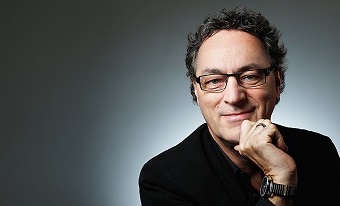
Gerd Leonhard analyses how digitisation changes the economic and the living environment. An interview with the famous futurist.
Musician, producer, future-shaper
Gerd Leonhard is one of the internationally leading futurists. He is known for his provocative yet inspiring presentations and theses on future developments. He spent 17 years in the U.S. where he experienced and shaped the digital future as a professional musician and producer, later as an digital entrepreneur. At the Van Innovation Campus by Mercedes-Benz in September he acted as keynote speaker. In this interview, he analyses the megatrends of the upcoming years – and the impact they will have on mobility and transport.
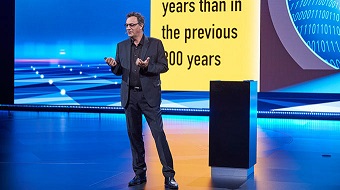
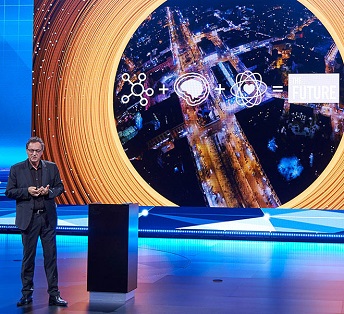
Seeing the world through external eyes
Mister Leonhard, one of your theses is: “Mankind will change more significantly in the next 20 years than it did in the last 300.” Which changes do you mean specifically?
Certainly, mankind has faced a lot of changes, upheavals and revolutions already – yet never before at such speed and in this complexity. Currently, there are roughly 20 topics and trends which will have a major impact on our lives. Among the most essential is artificial intelligence. This is no longer about using machines in order to make our work easier. Technology changes us as human beings. We are using external brains to do our thinking. We are using external eyes to see for us. We are using computers as conversation partners and give them orders. Automation, robotisation, virtualisation – all these things happen at the same time and in an exponential development. And they will bring along bigger changes than we can estimate today.
In which areas of life will we feel the impact of these trends most strongly?
Basically, you can assume that everything that can be digitised will be digitised. Computers will be able to learn. They will take care of things that before only people were capable of – for example recognising complex patterns or creating rules for irregular situations. In five to seven years, computers will have a bigger capacity than the human brain and they will solve certain problems better, faster and more efficiently than man could. They will diagnose and treat illnesses, they will manage traffic, improve environmental protection and a lot more.

Intelligent through networking
You already mentioned it: networking, digitisation and artificial intelligence have a major impact on traffic, thus on transport and mobility. What will the mobility of the future look like in your opinion?
In roughly ten years, there will be approximately 380 cities with more than a million citizens. In order to meet the requirements of transportation in these urban centers, we must organise the transport of people and goods more intelligently, efficiently and sustainably. I am convinced, for example, that the traffic in these metropolises and metropole regions will be carried out by 95 percent automated vehicles.
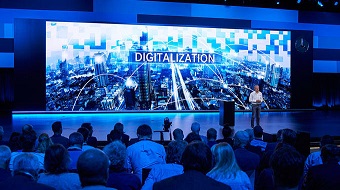
The stage screens of a lecture during the Can Innovation Campus show the illustration of a networked city – the key term is “digitization”.
Sport shoes? Just print them at home
Which solutions and impulses can technological innovations provide that go beyond autonomous driving?
Many goods and parts will not need to be transported any longer. Already there are 3D printers by FedEx and UPS at many airports printing machine parts for airplanes. These printers are still too expensive for mass deployment – this will change in the next years. We will print many things simply at home or in the next shopping mall. On top of that, there are intelligent Shared-Mobility concepts and models already emerging in many places which smartly cross-connect street, rail and individual traffic with each other.
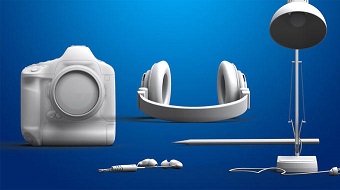
Holistic thinking is very important here. It is no longer simply a matter of transportation but a matter of developing perfect individual mobility services.
Customers want added value and service
What do these developments mean for the automotive and transport industry?
They – as will all other industries – will have to stop thinking solely about core products but about offering individual services. They must offer their clients added values. In ten years, driving a car will not be what it is today – but a matter of mobility services fulfilling the individual needs of the customers. And many will be willing to pay more for certain kinds of services. Thus, holistic platform thinking is the profitable model of the future.
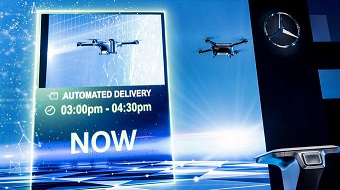
When the car is booking the hotel
Which services could that be in practical terms?
There are no limits to the imagination. In the transport industry, the topics will be speed and efficiency. With private customers, any number of motives might be considered. One person may want maximal comfort and ask for a hotel and a restaurant reservation on arrival without having to take care of it. Someone else might request optimal working conditions in the car. And the next one might like to have a car at their disposal whenever they need one without having to buy it, the keyword here is pay-per-use. It will be fascinating to watch which ideas emerge in that area – and which of them will catch on.
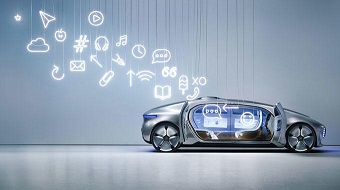
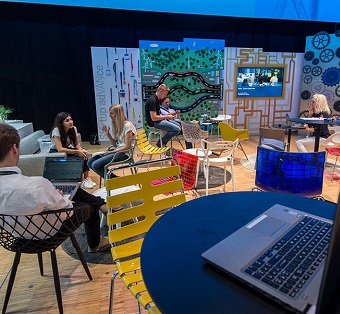
Competition accelerates innovation
Your presentation at the Van Innovation Campus ended with a quote by David Bowie: “Tomorrow belongs to those who can hear it coming.” Are you under the impression that the automotive industry is hearing what tomorrow will bring?
More so than others. In some industries, whether it be banks, insurances or the pharma industry, progressive thinking has not yet begun. And I am convinced that in these industries, many companies will not survive the change. In the automotive industry, things are different. Things that were regarded science fiction a few years ago have become a reality today, autonomous driving for example. In addition to that, new players enter the market. This changes the competition and increases the speed of innovations. Also, car manufacturers share the advantage that technology is their daily business – unlike in other industries. This is why the automotive industry is better prepared for the change and the challenges that come along with it.